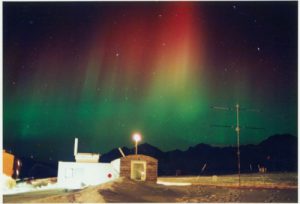 The Scientific Committee on Solar-Terrestrial Physics (SCOSTEP) was originally established in January 1966 by the XIth General Assembly of the International Council of Scientific Unions (ICSU; now the International Science Council, ISC) as the Inter-Union Commission on Solar-Terrestrial Physics (IUCSTP.) At its XIVth General Assembly in September 1972, ICSU reorganized IUCSTP as a special committee with responsibility for interdisciplinary solar-terrestrial physics programs of finite duration. The designation SCOSTEP took effect in September 1973 after the ratification of a new Constitution by the ICSU Executive Board and General Committee. In September 1978, with the ratification of the current Constitution by the XVIIth ICSU General Assembly, SCOSTEP became a Scientific Committee of ICSU charged with the long-term responsibility to promote international interdisciplinary programs in solar-terrestrial physics. In May 1982, SCOSTEP held its first General Council Meeting under the new Constitution. The Constitution was revised in 1988 and is available in its current form here.
The Scientific Committee on Solar-Terrestrial Physics (SCOSTEP) was originally established in January 1966 by the XIth General Assembly of the International Council of Scientific Unions (ICSU; now the International Science Council, ISC) as the Inter-Union Commission on Solar-Terrestrial Physics (IUCSTP.) At its XIVth General Assembly in September 1972, ICSU reorganized IUCSTP as a special committee with responsibility for interdisciplinary solar-terrestrial physics programs of finite duration. The designation SCOSTEP took effect in September 1973 after the ratification of a new Constitution by the ICSU Executive Board and General Committee. In September 1978, with the ratification of the current Constitution by the XVIIth ICSU General Assembly, SCOSTEP became a Scientific Committee of ICSU charged with the long-term responsibility to promote international interdisciplinary programs in solar-terrestrial physics. In May 1982, SCOSTEP held its first General Council Meeting under the new Constitution. The Constitution was revised in 1988 and is available in its current form here.
 The Scientific Committee On Solar-TErrestrial Physics (SCOSTEP) organizes and conducts international solar-terrestrial physics (STP) programs of finite duration in co-operation with other ISC bodies. They share results of these programs by joining in conducting meetings, conferences, and workshops and by publishing newsletters, handbooks, and special journal issues about these STP programs. SCOSTEP is an outgrowth of earlier bodies in ISC involved in planning and implementing the International Geophysical Year (IGY: 1957-58) and the International Quiet Sun Year (IQSY: 1964-65). Completed SCOSTEP programs include: International Magnetospheric Study (IMS: 1976-79); Solar Maximum Year (SMY: 1979-81); Middle Atmosphere Program (MAP: 1982-85); and Solar-Terrestrial Energy Program (STEP: 1990-97). Four Post-STEP programs over the period 1998-2002 include: STEP-Results, Applications, and Modeling Phase (SRAMP); International Solar Cycle Study (ISCS); Planetary Scale Mesopause Observing System (PSMOS). Recent programs that have taken place are: Equatorial Processes Including Coupling (EPIC); Climate and Weather of the Sun-Earth System (CAWSES: 2004-2008); CAWSES II (2009-2013); VarSITI (2014-2018). The newest longterm program is PRESTO (2020-2024).
The Scientific Committee On Solar-TErrestrial Physics (SCOSTEP) organizes and conducts international solar-terrestrial physics (STP) programs of finite duration in co-operation with other ISC bodies. They share results of these programs by joining in conducting meetings, conferences, and workshops and by publishing newsletters, handbooks, and special journal issues about these STP programs. SCOSTEP is an outgrowth of earlier bodies in ISC involved in planning and implementing the International Geophysical Year (IGY: 1957-58) and the International Quiet Sun Year (IQSY: 1964-65). Completed SCOSTEP programs include: International Magnetospheric Study (IMS: 1976-79); Solar Maximum Year (SMY: 1979-81); Middle Atmosphere Program (MAP: 1982-85); and Solar-Terrestrial Energy Program (STEP: 1990-97). Four Post-STEP programs over the period 1998-2002 include: STEP-Results, Applications, and Modeling Phase (SRAMP); International Solar Cycle Study (ISCS); Planetary Scale Mesopause Observing System (PSMOS). Recent programs that have taken place are: Equatorial Processes Including Coupling (EPIC); Climate and Weather of the Sun-Earth System (CAWSES: 2004-2008); CAWSES II (2009-2013); VarSITI (2014-2018). The newest longterm program is PRESTO (2020-2024).
SCOSTEP operates as a Research Programme of the ISC, its General Council providing oversight for SCOSTEP operations and participating in the election of the Executive Officers. A Bureau directs scientific, administrative, and financial activities. They select the Scientific Secretary who administers the Secretariat, organizes meetings, and conducts the financial business of SCOSTEP. An international group of Scientific Discipline Representatives provides advice to SCOSTEP about scientific programs and serves to link activities in their fields to these programs. They lead within SCOSTEP and through other ISC bodies to propose new programs and participate in the Steering Committees and projects of ongoing programs. Funding for these activities comes from ISC annual grants; annual National Adherent subscriptions; and special grants as well as from services provided by host organizations. The Scientific Secretary provides an annual audited financial statement to ISC and the Bureau. SCOSTEP seeks opportunities for interaction with national and international programs involving STP elements. It provides guidance to the STP discipline centers of ISC’s World Data Center system. It attempts to develop and sustain student interest in Sun-Earth Connections, to promote efficient exchange of data and information between STP scientists in all countries, and to seek projects and programs that cross over traditional boundaries of physical regions and focused scientific disciplines.
SCOSTEP has been led by a series of excellent and dedicated Executive Officers since its inception. Click here for a list of the SCOSTEP Executive Officers and Scientific Programs since 1968.
